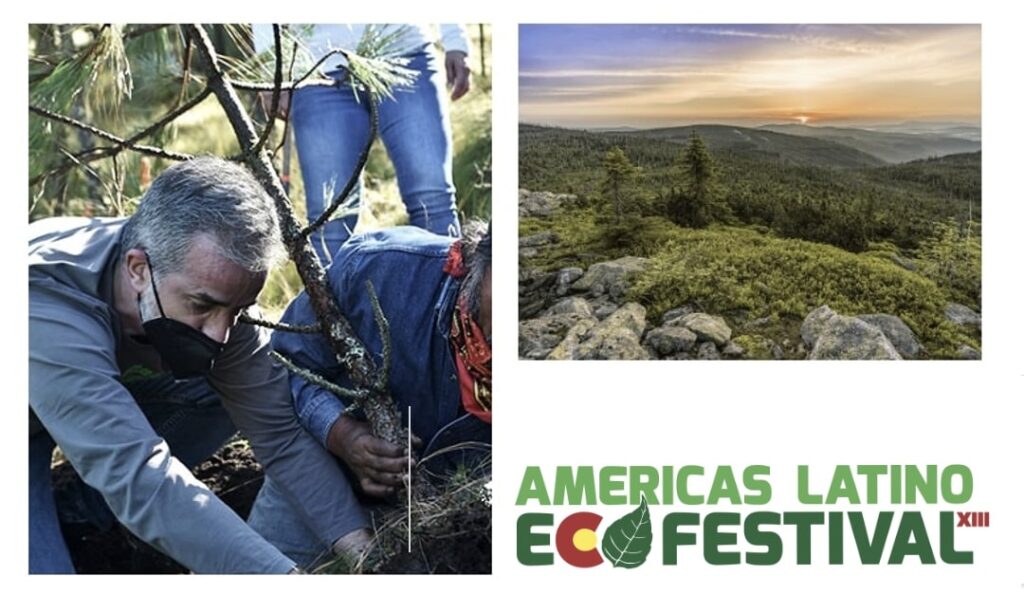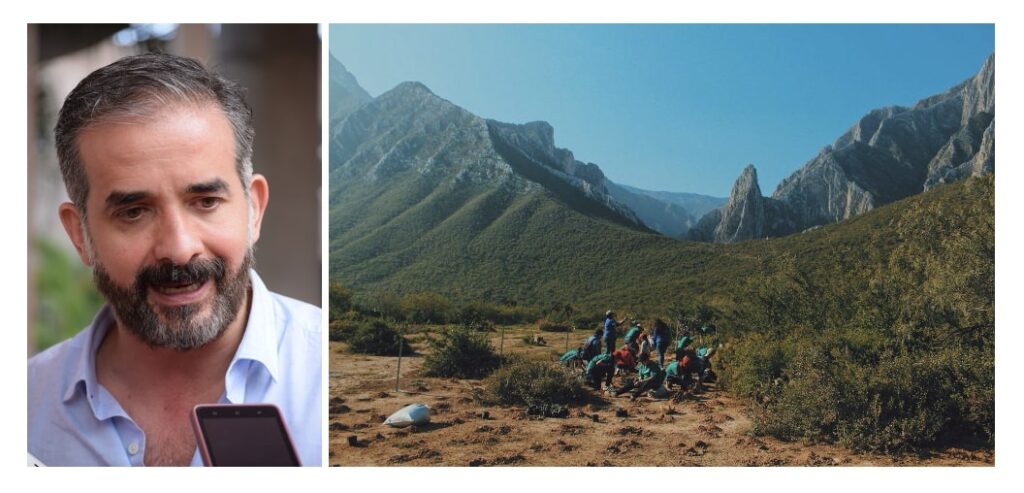
REACHING THE SUMMIT OF TREE EQUITY IN DENVER | Ernesto Herrera advocates for the creation and conservation of urban forests. (Photo/Press ALEF)
ERNESTO HERRERA, MEXICAN SUSTAINABILITY EXPERT, ATTENDS THE XIII AMERICAS LATINO ECO FESTIVAL.
Newsroom El Comercio de Colorado
Haga click aquí para leer la versión en español
Ernesto Herrera, a renowned industrial engineer, and leader in environmental conservation, emphasizes the urgent need to develop urban forests as a fundamental strategy to address environmental challenges and promote healthier and more sustainable lifestyles in cities. Herrera stresses that the rapid growth of urban population has led to water scarcity and increased temperatures in cities, phenomena that could be mitigated through planting and caring for trees in urban environments.
Herrera highlighted the critical situation of cities such as Mexico City, Guadalajara, and Monterrey, which face serious problems of drought and water scarcity due to the loss of forests and green areas. This water crisis, according to Herrera, underscores the urgent need to prioritize the creation and conservation of urban forests. The expert pointed out that access to trees and green areas has become a matter of equity. “Areas with fewer trees tend to have worse living conditions, including high temperatures, increased air pollution, and higher levels of violence,” he says.
People Ecosystem
Herrera, who will participate as a panelist at the Americas Latino Eco Festival in Denver, emphasized the importance of sharing knowledge and experiences on the implementation of urban forests in Latin America, as well as involving citizens in the planning and maintenance of these spaces. “We must create an ecosystem of people, of talent, that can drive these changes so that governments improve regulations or allocate more budget for trees,” Herrera concludes.
Register


Americas Latino Eco Festival – Tree Equity Summit and Workshop
April 11th
8:30 a.m. to 4:30 p.m.
CSU Spur
4777 National Western Drive
Denver, CO 80216

Interview with Ernesto Herrera
Jesús Sánchez Melean: We are chatting with our good friend Ernesto Herrera. He is Mexican. He’s joining us from Monterrey, Nuevo León; he traveled to that city to witness the solar eclipse. He is one of the panelists coming to the Tree Equity Summit in Denver as part of the Latin America Eco Festival.
What are your expectations for coming to Denver and what is the main message you want to share?
Ernesto Herrera: It’s very gratifying to be able to share with Latino colleagues about nature conservation issues. At Reforestamos, the organization I lead, we were born as a response to the 1998 wildfires, which were severe here in Mexico. Since then, we started working on tree and forest-related issues. But one of the topics that interests us is understanding and learning more about why forests are being lost. We realize that in Mexico, this is closely related to the lack of opportunities for people living in rural areas.
So, forests are not providing enough livelihoods, and that’s why people seek better opportunities and migrate. This population migrates to Mexico’s major cities. They also migrate to the United States or wherever they can find these better opportunities to live. But precisely when they migrate to the big cities, what happens is that urban forests are lost, and all people, especially those of us living in cities, stop receiving all the environmental services necessary for urban life. We stop receiving enough water. Here in Mexico, we have a tremendous water crisis. The major cities are losing the forests that infiltrate that water.
JSM: You are in Monterrey, where there is a serious environmental problem, which is the lack of water. I mean the drought in the Nuevo León area. I don’t know exactly if it only affects the Monterrey area or other areas do not.
EH: The drought affects the major cities in the central part of the country—Guadalajara, Monterrey, Mexico City, León. These big cities are all very threatened by this climate change and are cities that have grown a lot in the last 50 years. In 1950, the urban population in Mexico was about 40 percent of the total population. Currently, the urban population represents 80 percent. There are about 80 million people living in cities with more than 100,000 inhabitants.
So we must include in the agenda the care and creation of urban forests. And we must guarantee equity in access to these forests by different groups. We know that, in many places on the planet, the poorest places are the places with the least access to trees, and they are places with a higher incidence of respiratory diseases or more violent places. So this issue of urban forests is something that we as a Mexican organization are very interested in promoting.
At this meeting there in Denver, I will share a little of what we have done. The idea is to share knowledge about experiences in other places in Latin America because by sharing in Spanish, we can have a deep learning experience. We have been promoters of a distinctive badge that was born in the United States, which is the Three Cities of the World badge.
It is created by the Arbor Day Foundation, of which I am also part of the Board of Directors. So this Cities of the World movement, which is also in alliance with the Food and Agriculture Organization of the United Nations (FAO). So this badge was translated into Spanish and shared in Mexico and Latin America.
It has been very interesting because in some way, we have sparked interest in local governments. We have also gradually been getting to know citizens interested in this issue. We must create an ecosystem of people, of talent, that can drive these changes so that governments improve regulations or allocate more budget for trees.
It is important for citizens to organize and match so that this whole ecosystem works. And what does that ecosystem consist of? Well, everything related to appropriate regulations, available resources, nurseries, nurseries with the right trees because sometimes it may be that the available nurseries are producing trees that are not suitable for the city.
So the citizens arrive, buy bad trees, plant them, and it’s chaos. So everything requires a lot of order, a lot of information, a lot of participation, and it is a great opportunity also for the development of new livelihoods. A few months ago, we met in Dallas, Texas, with an organization that is experiencing a lack of arborists, of people who do the work and who are giving maintenance to the trees.
So what opportunities for people who are migrating, who suddenly arrive with a gardener’s hat, maybe they can develop new skills in terms of arborists. If there is a need for talent to maintain the trees, it is a great opportunity to provide employment to the Latin population that migrates to the United States and that provides a service that is necessary for the well-being of cities.
JSM: You are part of the International Union for Conservation of Environment. You preside over the committee that follows the issues of Mesoamerica, which goes from Panama to northern Mexico. That is, you have that regional, global, regional vision, but at the same time, you have the Mexican vision. Likewise, you have just been recognized as one of the 15 sustainability-minded leaders in Mexico. That is the ranking Forbes magazine makes.
Urban forests represent a solution for a healthy and sustainable life
In that context, identify, or put me in context, what is the fundamental environmental problem in Mexico that must be solved and if Mexico is going in the right direction to solve it?
EH: I have just been talking with colleagues who are the presidents of the National Committees of Mexico, Guatemala, Panama, Costa Rica, all these eight countries that make up this Mesoamerican region, which we collaborate under the umbrella of the International Union for the Conservation of Nature. We have discussed that one of the great challenges we have, which adds to any other problem, is that there is scarce information available. There is a lot of opacity in environmental information.
So, without that information, many of the actors are not making the best decisions, and in this world of opacity, it lends itself a lot to corruption, organized crime actions. And this is also affecting a lot of people living in areas that are important for conservation and are areas where megaprojects or mining can reach, which really put the environmental integrity of these important areas at great risk. So those people begin to defend their natural resources and become victims of crime and are.
They are people who often end up being murdered. So those are the most complex issues we have in the Mesoamerican region. Many people die defending nature. It is the region where most people die on the planet. In Mexico, which is within that region, very large projects that want to be executed have been seen, and many times the human rights of many people are stepped on.
So that is the great challenge we have, and obviously, all that problem is seen with weaker public organizations, without so much budget. It is no longer the government’s priority to take care of nature. Environmental issues may be seen as a nice, romantic issue, and the authorities do not necessarily understand the environment as a strategic issue. If we do not have a planet, then we will not have a society and we will not have an economy.
Urban forests represent a solution for a healthy and sustainable life
JSM: Do you feel that at this moment Mexico is moving in the right direction, in understanding those issues? Is there an awareness in Mexico of the right direction in environmental matters?
EH: I would love to say that we are doing well as a country. But, there are certain sectors that may be advancing while others are moving more slowly. In Mexico, we need to ensure that in this government transition, we can rethink this environmental agenda and give it greater priority and attention. If we have a more left-leaning government, then the environmental agenda should be recognized, and we can promote everything that is environmental democracy.
Greater participation and the creation of more civic space where people can co-create environmental policies with transparency should be promoted. Without polarization. I don’t know why we’ve also had a very polarized six-year term where there hasn’t been much dialogue, where civil society organizations haven’t had a conversation with the federal government, and we’ve lost many opportunities to improve this agenda.
I would say we are not making progress. But I also have to recognize that there are sectors like the private sector that are increasingly interested in reaching or seeking to fulfill more ambitious commitments in the climate agenda, in the emissions reduction agenda, and gradually, they have been understanding better this biodiversity agenda. So they begin to see those discussions of what it means for a company to be nature-positive.
There we see many opportunities, but there is still a lack in the private sector that does not see this agenda as merely a philanthropic issue, but really can talk about how they are going to make impact investments, develop ventures that are compatible with conservation so that it is effectively sustainable because philanthropic resources will not be enough.
Urban forests represent a solution for a healthy and sustainable life
JSM: You, who are classified as a brilliant mind in the field of sustainability. What are the values or principles consistent with the sustainability of the planet that ordinary people should have?
EH: I would tell them to have two points of focus. The first is to be more aware of what one consumes, of how to reduce the environmental footprint based on what is bought. So, there may be a transformation of lifestyles. If we eat a lot of meat, there is no planet that will suffice for us. So if we reduce meat consumption, we are reducing opportunities to deforest on our planet, and that will be good, and it is also good for health. A better, healthier diet is good for health and good for the planet. Also, if one consumes less meat, they are also consuming less water. Producing one kilogram of beef requires 15,018 liters of water.
So a lot of water is consumed just to produce one kilogram of meat. While eating chicken means that much less water is consumed for its production. About 3,004 liters are invested, which are still many but much less than beef. So it is to be more aware of what one does, what one consumes. And from a political point of view, it is to be asking, demanding from local governments, state governments, national government, that they can push the conservation agenda. It should not be partisan politics. The environmental issue should be addressed by any government.
These issues, such as tree equity, speak a lot about that. There are places in Mexico, most of those that do not have access to trees, and have a high incidence of lung diseases. The air is dirtier in those places. Also, they are places that will be hotter because there is less shade for protection. And generally, in these same arid areas, there is more violence.
So crime escalates as the temperature rises. The more we can see trees, forests as natural solutions to many problems we have, then we will be making progress. Trees give us health, trees also give us economic well-being. If a property has trees, its value increases by 20 percent. So it’s also good for the economy.
JSM: I only have one more question for you, since you are in Monterrey, do you follow Rayados or Tigres, the two teams from Monterrey? Or being from Mexico City, do you follow América or Pumas?
EH: My team is Pumas. The Pumas from Ciudad Universitaria in Mexico City.
JSM: We look forward to shaking your hand in a few days here in Denver. Thank you very much.
EH: Thank you very much, Jesus, and greetings to your audience. Greetings to Denver.
Urban forests represent a solution for a healthy and sustainable life
You may also like:
Lidia Soto-Harmon: “Hispanics are part of the solution to the environmental crisis in the US”
International Exhibition “The Giving Tree”, an “artivist” tribute to nature
Gil Peñalosa: “The Lack of Equity in Green Spaces is Unacceptable”






otras noticias
Run, Breathe, and Be Amazed at LUNA
Colorado Legislature Approves Law to Boost Food Truck Industry
Polis has 30 days to sign, veto, or let SB25-276 take effect